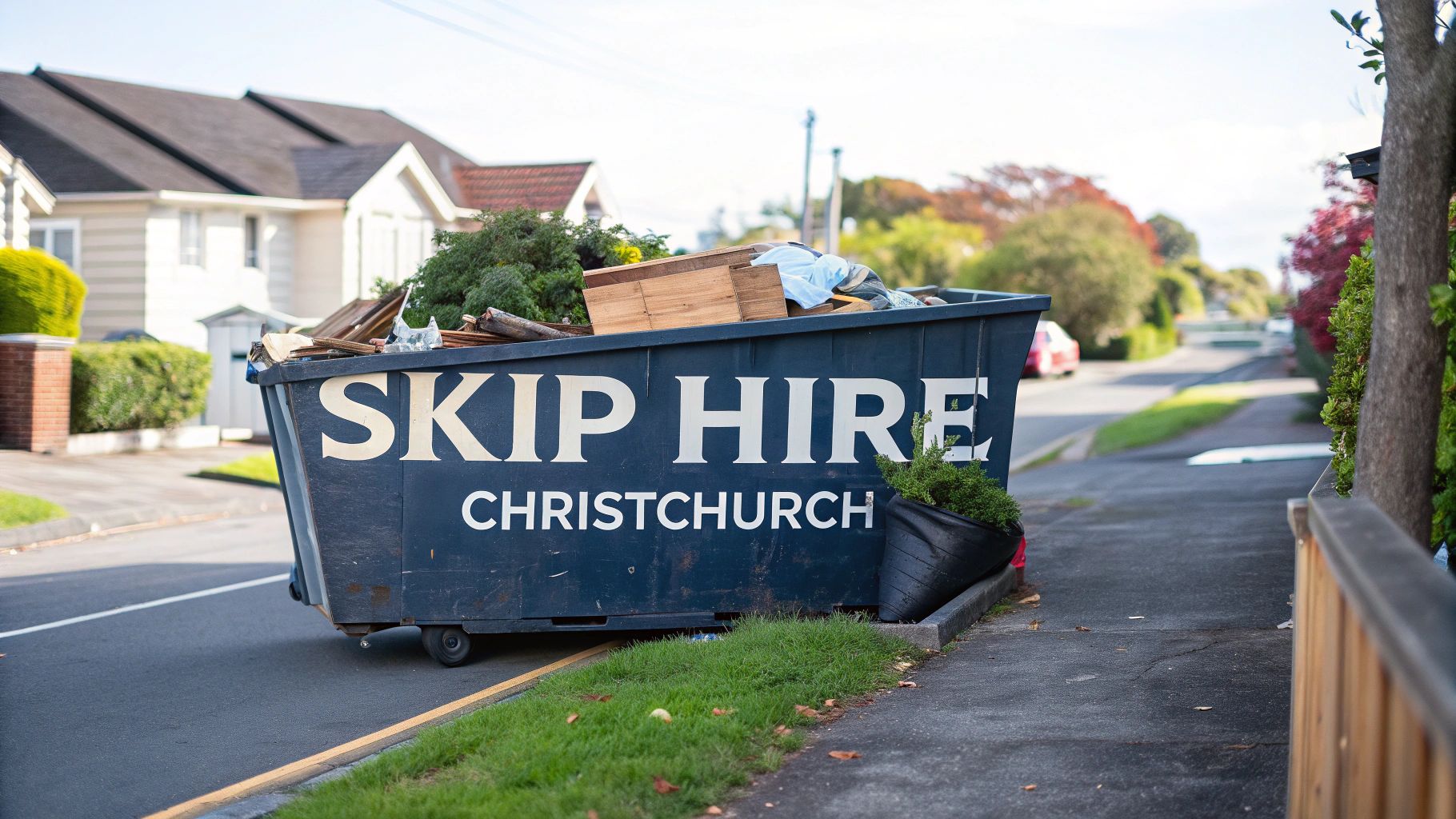Where to Dispose of Dirt in Dorset: 6 Best Options for 2025
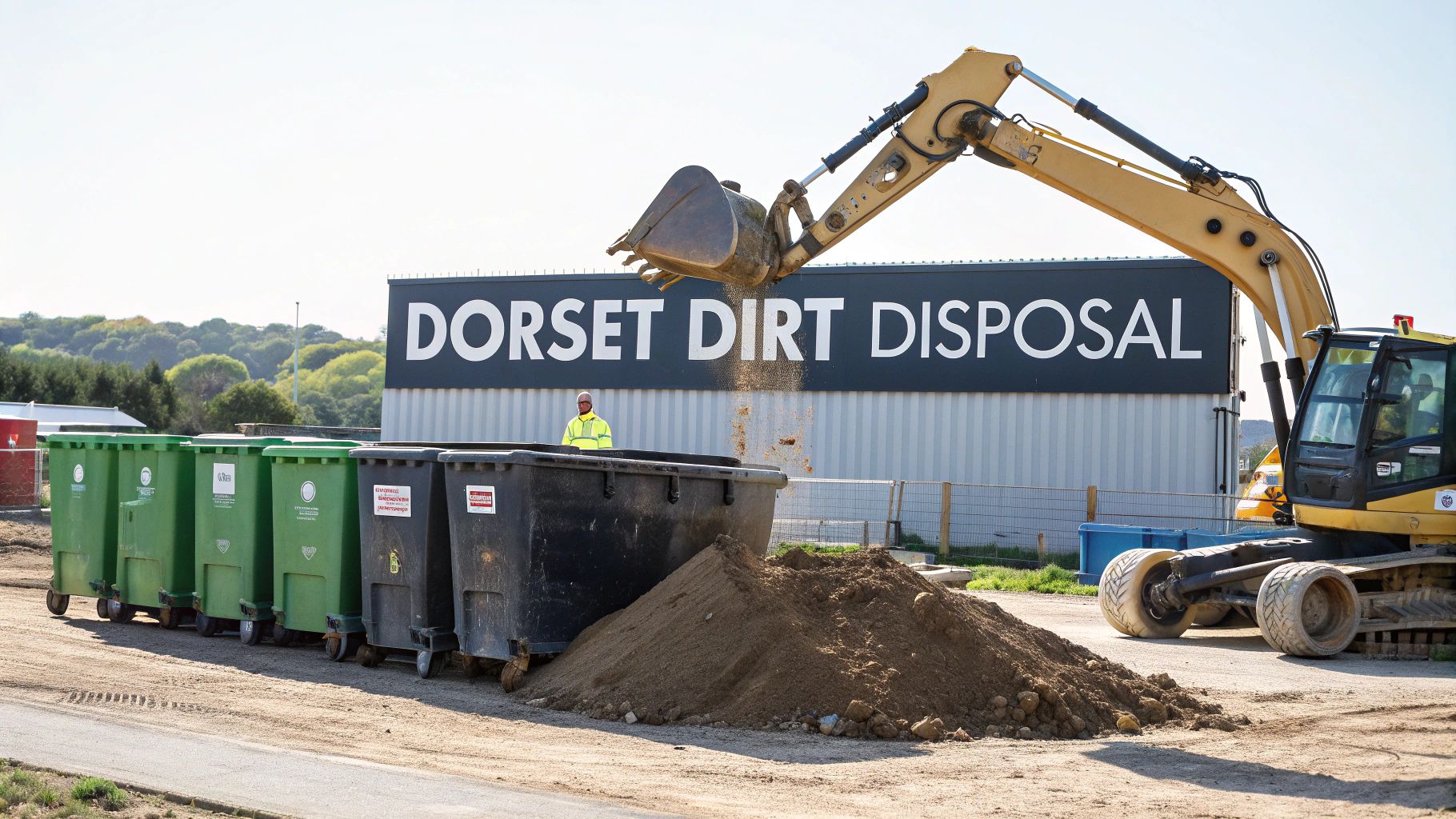
Where to Dispose of Dirt in Dorset: 6 Best Options for 2025
Whether you're landscaping your garden, digging foundations for an extension, or managing a large construction site in Dorset, one challenge remains universal: dealing with the leftover soil. It’s far heavier and more regulated than typical waste, and knowing where to dispose of dirt legally and efficiently can save you significant time, money, and potential fines. Improper disposal not only risks penalties but can also harm the local environment, making responsible practices essential for everyone from DIY enthusiasts to professional contractors.
This guide simplifies the entire process. We break down the six most practical and compliant disposal methods available across Bournemouth, Poole, Weymouth, and the wider Dorset area. We will explore everything from the convenience of professional services like skip hire and grab lorries to cost-effective community solutions and on-site reuse strategies.
Forget the guesswork and uncertainty. This comprehensive list provides actionable steps, helping you find the perfect match for your project's specific scale, budget, and timeline. By understanding your options clearly, you can ensure your soil and excavation waste is handled responsibly, keeping your project on track and in full compliance with local regulations. Let's dig in and unearth the best solution for you.
1. Skip Hire: The All-Rounder Solution for Mixed and Heavy Waste
For projects generating more than just soil, skip hire offers a versatile and straightforward solution. It’s the go-to choice when you need to dispose of dirt alongside other construction, demolition, or garden waste like rubble, bricks, concrete, and green waste. A skip provides a single, contained space for all your materials, simplifying the entire disposal process.
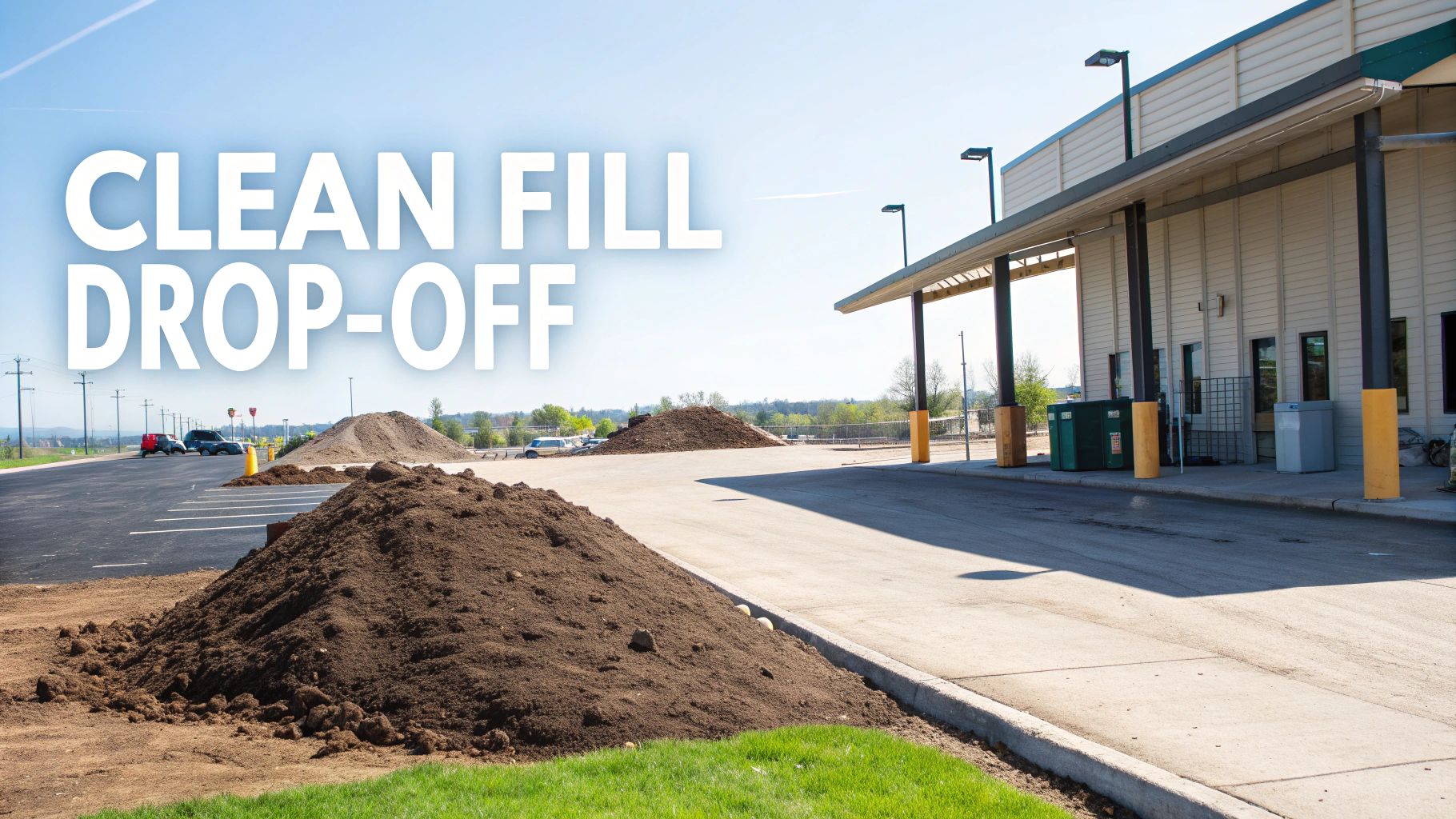
Companies like The Waste Group deliver a skip directly to your property in Dorset, and once it's full, they collect it for you. This eliminates the need for multiple trips to a recycling centre or tip, saving you considerable time and effort. The convenience of having one container for mixed heavy waste makes it a highly efficient method for keeping your site tidy and organised.
When is Skip Hire the Right Choice?
Skip hire is particularly effective for medium-to-large scale projects where waste volumes are substantial. Consider these scenarios:
- Garden Redesigns: A homeowner in Bournemouth undertaking a garden overhaul and new patio installation can use a skip to dispose of old turf, excess soil, and broken paving slabs all at once.
- Building Extensions: A small builder in Dorchester excavating foundations for a new extension will generate a mix of soil, clay, and broken bricks, which can be easily managed with a suitably sized skip.
- Landscaping Clearances: A landscaping project in Poole clearing an overgrown garden can fill a skip with soil, uprooted stumps, roots, and other green waste.
Practical Tips for Hiring a Skip
To get the most out of your skip hire, a little planning goes a long way.
- Load Strategically: Use a wheelbarrow with a sturdy ramp for safe and efficient loading. Place heavy, dense materials like soil and rubble at the bottom and distribute them evenly. Break down larger items to maximise every inch of space.
- Book in Advance: Dorset's peak seasons for home and garden projects are spring and summer. To secure your preferred delivery date and skip size, it's wise to book ahead.
- Check for Restrictions: Always confirm with the provider if they have limitations on certain materials. While most soil is acceptable, contaminated soil (e.g., with asbestos or chemicals) requires specialist handling.
- Arrange a Permit if Needed: If the skip must be placed on a public road or pavement, you will need a permit from the local council. Reputable suppliers can often arrange this for you for an additional fee.
By covering all bases from delivery to collection, skip hire stands out as an incredibly reliable way to manage and dispose of dirt and associated waste from any Dorset project. For more details on sizes and booking, you can explore the options for skip hire in Dorset.
2. Online Dirt Exchange Platforms and Classifieds
For those with clean, uncontaminated soil, online exchange platforms offer a highly sustainable and often free way to dispose of dirt. These digital services connect individuals who have excess soil with those who need it for landscaping, garden projects, or filling low spots on their property. This peer-to-peer method turns your waste into a valuable resource for someone else, promoting a circular economy.
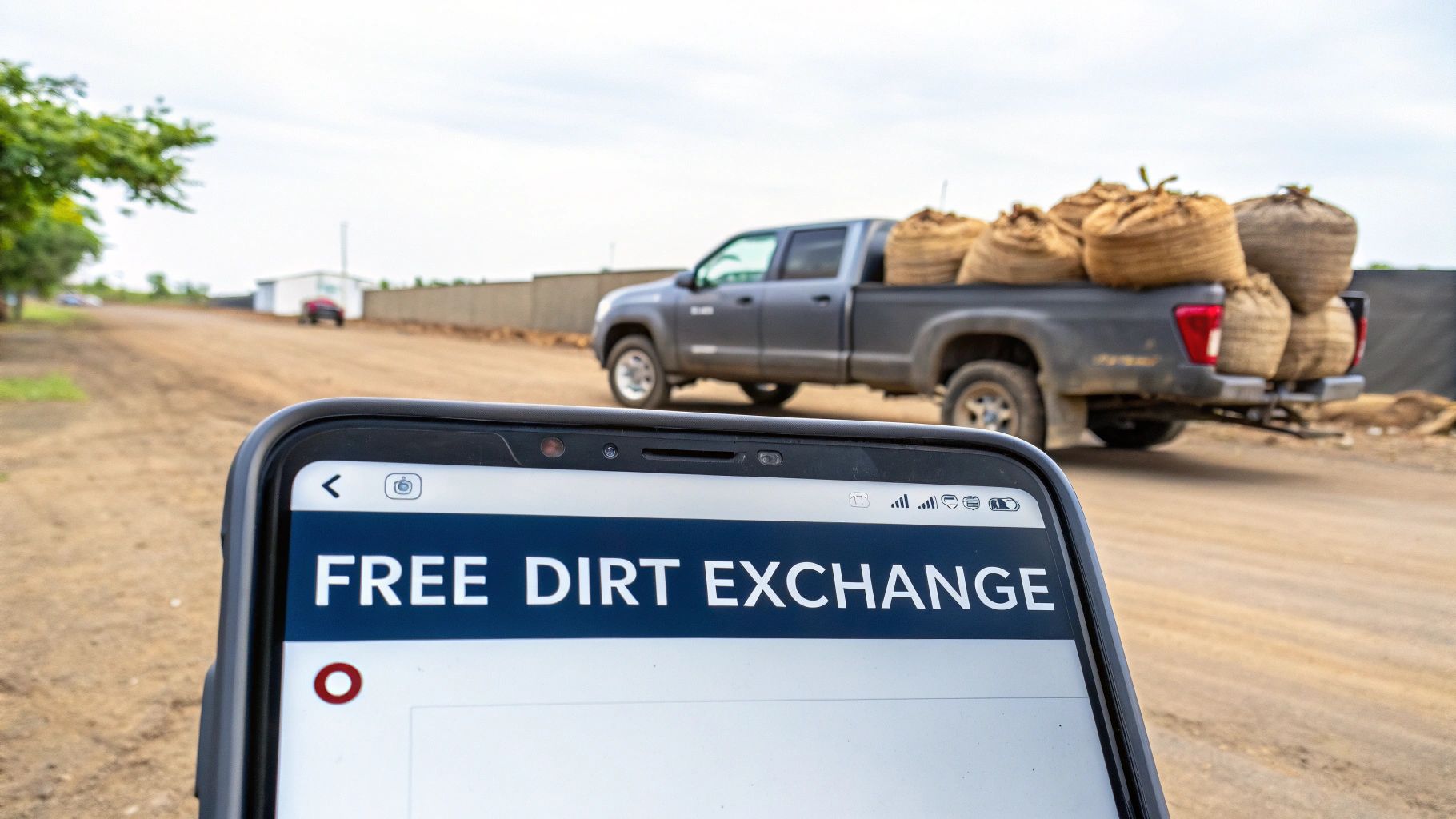
Websites like Gumtree, Facebook Marketplace, and even specialised platforms act as a community noticeboard for materials. By listing your available dirt, you can quickly find a local person in Dorset who will often collect it from you, saving you the cost and hassle of transport and disposal fees. It’s an ideal solution for smaller quantities of soil where hiring a skip or lorry would be excessive.
When are Online Exchanges the Right Choice?
This method is perfect for smaller domestic projects and for anyone looking for the most cost-effective and environmentally friendly disposal option. Consider these scenarios:
- Small Garden Levelling: A homeowner in Weymouth levelling a small lawn area can list a few wheelbarrows' worth of topsoil on a local Facebook group, where a neighbour might need it for their raised garden beds.
- Pond Excavation: Someone digging a new garden pond in Bridport can offer the resulting clean soil to a local allotmenteer looking to improve their plots.
- Post-Landscaping Surplus: After a landscaping project in Sherborne, leftover screened soil can be quickly claimed by another local resident undertaking a DIY garden project.
Practical Tips for Using Online Exchanges
To ensure a smooth and successful exchange, clarity and honesty are key.
- Post Clear Photos: Take well-lit pictures that accurately show the quantity and quality of the dirt. This helps potential takers understand exactly what they are getting.
- Be Specific in Your Description: Clearly state whether the soil is topsoil, subsoil, or clay. Mention if it has been screened or if it contains stones, roots, or other organic matter.
- Clarify Logistics: Be upfront about collection arrangements. Specify if the taker needs to bring their own bags and tools, and if you can assist with loading. If you are willing to deliver for a small fee, mention that too.
- Respond Promptly: These listings often get a lot of interest. Responding quickly to enquiries ensures you can arrange a swift collection and avoid having the pile of dirt sit on your property for too long.
- Break It Down: If you have a large amount, consider offering it in smaller, more manageable loads. This can attract more people who may only have a car or small trailer for transport.
By connecting directly with people in your community, online platforms provide a simple, no-cost answer to the question of where to dispose of dirt, all while helping a fellow Dorset resident with their own project.
3. Professional Dirt Removal Services: The Hands-Off Approach
For those who want a completely hands-off solution, professional dirt removal services offer a comprehensive and efficient way to dispose of unwanted soil. These specialised companies manage the entire process for you, from the physical labour of loading the dirt to its transportation and final, compliant disposal. This service is ideal when you lack the time, equipment, or physical ability to handle heavy soil removal yourself.
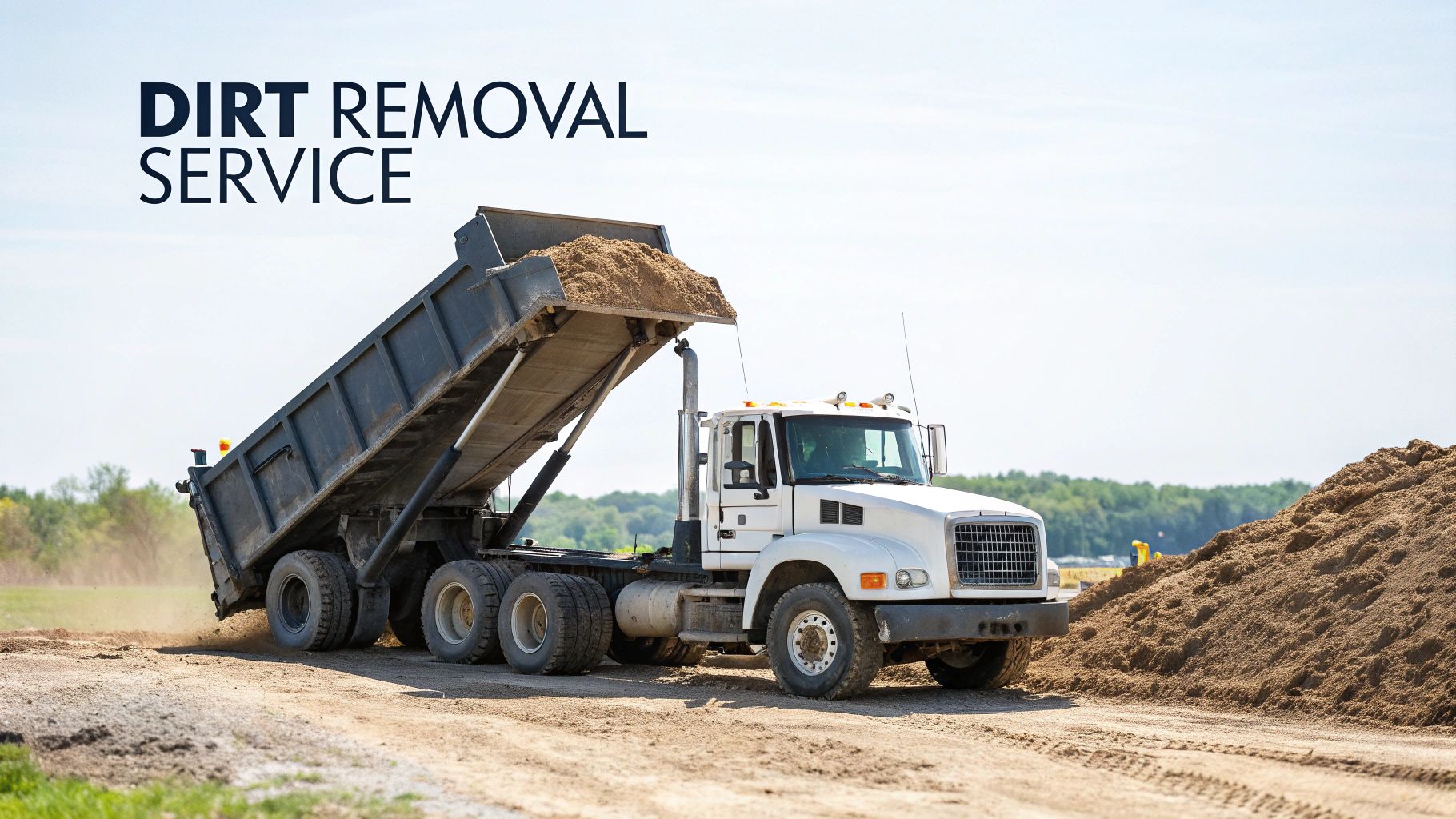
Unlike hiring a skip or a grab lorry where you do the groundwork, these services send a team to your Dorset property to do all the heavy lifting. They arrive with the right tools and vehicles, load the soil, and ensure the area is left tidy. This all-in-one package provides ultimate convenience, turning a major disposal task into a simple phone call.
When is a Professional Service the Right Choice?
This method is particularly valuable for situations where convenience and labour-saving are top priorities. Consider these scenarios:
- Small, Awkward Jobs: A Weymouth resident digging a small pond or creating new garden beds may find it impractical to hire a large skip for a modest amount of soil. A removal service can quickly clear the pile without any fuss.
- Time-Sensitive Projects: If you need dirt removed quickly to proceed with the next stage of your project, such as laying a driveway in Blandford Forum, a professional team can offer a fast turnaround.
- Lack of Manpower: For individuals unable to perform heavy manual labour, these services are a perfect solution for clearing soil from garden clearances or small-scale excavations.
Practical Tips for Hiring a Dirt Removal Service
To ensure a smooth and cost-effective experience, it's important to choose the right provider.
- Get Multiple Quotes: Contact at least three different companies to compare their pricing structures and service inclusions. This helps you find the best value for your specific needs.
- Ask About Disposal Methods: Inquire how the company disposes of the dirt. Reputable services will prioritise recycling or reusing the soil as clean fill rather than sending it straight to a landfill.
- Clarify All Costs: Confirm exactly what the quote includes. Ask about potential extra charges for difficult access, contaminated soil, or other unforeseen circumstances to avoid surprise fees.
- Check Reviews and Credentials: Before committing, look up online reviews and ensure the company is properly licensed and insured to operate in the Dorset area.
Professional dirt removal services provide a hassle-free answer to the question of where to dispose of dirt. For larger projects where heavy machinery is involved, you may find that the capabilities of grab lorry waste removal overlap with what these services offer, combining heavy lifting with efficient disposal. You can find out more about the benefits of grab lorry services to compare your options.
4. On-Site Reuse and Redistribution: The Sustainable, Cost-Free Option
Before exploring off-site disposal, the most sustainable and cost-effective solution is to reuse excess dirt on your own property. This method treats soil not as waste but as a valuable resource, eliminating transport costs and environmental impact. By creatively repurposing excavated earth, you can enhance your landscape, solve grading issues, and add functional features to your garden or land.
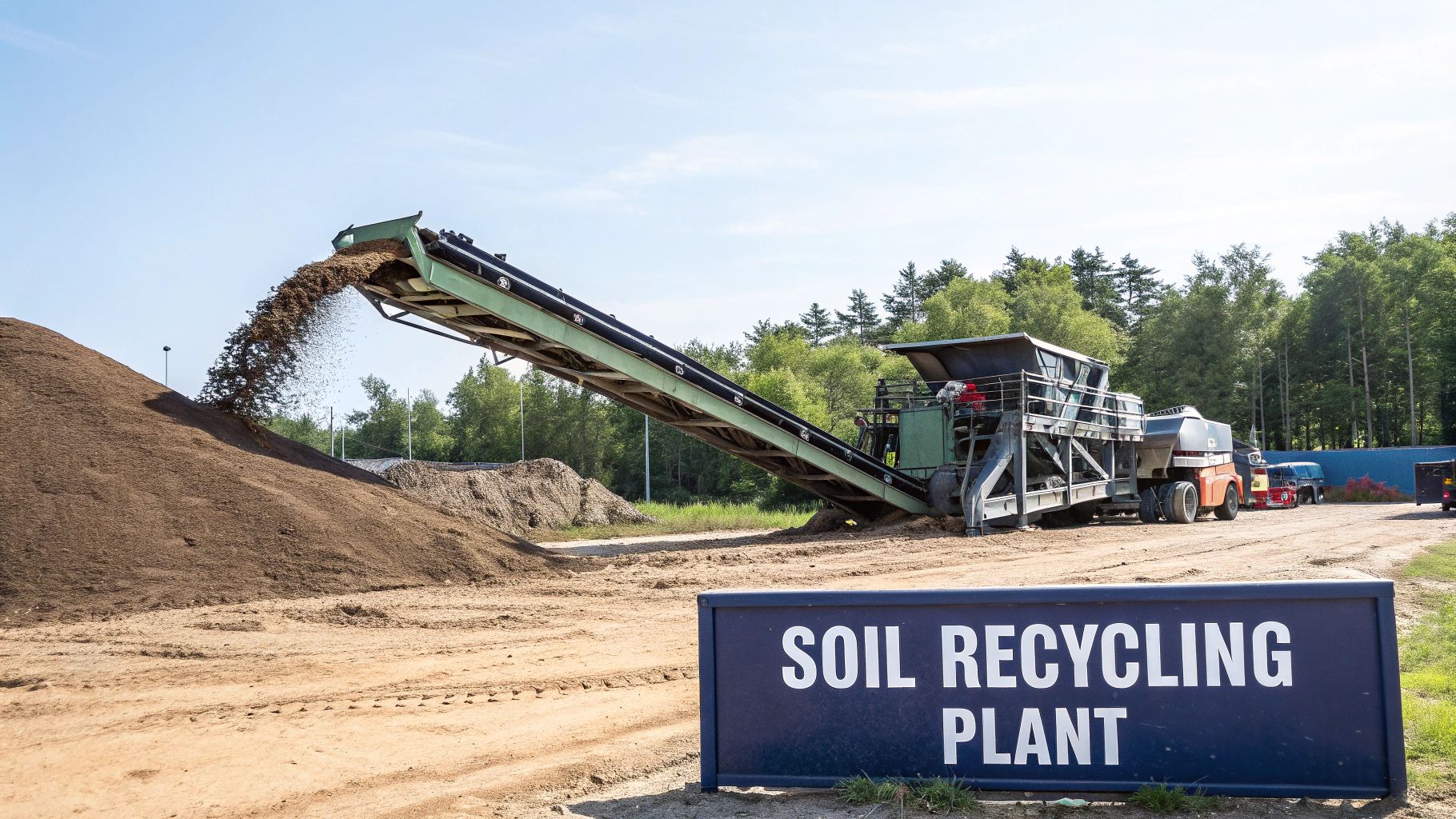
This approach aligns perfectly with sustainable land management, keeping soil within its local ecosystem. Instead of paying to have it hauled away, you can use the material to improve your property’s aesthetics and functionality. It’s an ideal choice for anyone looking for an eco-friendly answer to the question of where to dispose of dirt, transforming a logistical problem into a creative opportunity.
When is On-Site Reuse the Right Choice?
On-site reuse is a perfect fit for projects of all sizes where the excavated soil is clean and can be integrated back into the landscape. Consider these common Dorset scenarios:
- Garden Landscaping: A homeowner in Weymouth excavating for a new pond can use the removed soil to build raised flower beds or a decorative berm along a fence line, adding dimension and privacy.
- New Pool Installation: A residential project in Sandbanks generating a large volume of soil can redistribute it to level out a sloped garden, creating a more usable lawn area or a base for a new shed.
- Improving Drainage: An agricultural property near Blandford Forum can use excess topsoil from one area to improve field elevation in another, preventing waterlogging and enhancing crop-growing conditions.
Practical Tips for Reusing Soil
A thoughtful plan is key to successfully reusing soil on your property.
- Separate and Test: Keep topsoil (the nutrient-rich upper layer) separate from subsoil (fill dirt). Test the topsoil’s quality before using it in garden beds to ensure it’s suitable for planting.
- Plan Your Grades: When levelling an area or directing water flow, ensure you create a proper slope. A minimum grade of 2% (a 2cm drop for every 1m of distance) is typically needed to ensure effective drainage away from buildings.
- Rent Appropriate Equipment: For moving large quantities, renting a mini-digger, skid steer, or compact tractor can save immense physical effort and time, making the project far more manageable.
- Screen for Debris: Before placing soil in its final location, especially for gardens or lawns, screen it to remove large stones, roots, and other debris. This creates a better growing medium and a smoother finish.
- Check Local Regulations: If you plan on making significant changes to your property's grade, it’s wise to check with your local Dorset council for any ordinances related to earth moving to ensure compliance.
By repurposing soil on-site, you not only save money but also contribute to a more sustainable building and landscaping practice, making it a truly smart solution for dirt disposal.
5. Construction and Landscaping Companies: A Mutually Beneficial Solution
If your excavated dirt is clean and uncontaminated, you might find a new home for it with local construction or landscaping companies. These professionals often require large volumes of fill material for grading land, building up sites, or completing landscaping projects, making your excess soil a valuable resource rather than waste. This creates a win-win scenario where you find a free, efficient place to dispose of dirt, and they acquire necessary materials at no cost.
This method is particularly effective for clean, inert soil free from rubble, weeds, and contaminants. By connecting with active projects in your area, you can turn a disposal problem into a useful contribution to another development. It’s an environmentally friendly option that promotes reuse and reduces the amount of material sent to landfill.
When is This the Right Choice?
Connecting with trade professionals is ideal for those with a significant amount of clean soil and some flexibility on timing. Consider these scenarios:
- Large-Scale Excavation: A homeowner in Weymouth digging out a basement or swimming pool can offer their clean subsoil to a nearby housing development for grading new plots.
- Garden Levelling: A resident in Swanage levelling a sloped garden could provide topsoil to a local landscaper who needs quality material for creating new flower beds for another client.
- Commercial Site Clearance: A business in Ferndown clearing land for an extension might find a civil engineering firm working on a new road project that requires fill for embankments.
Practical Tips for Connecting with Companies
To successfully offer your soil, proactive communication and preparation are key.
- Time Your Outreach: The best time to connect is during the peak construction seasons of spring and summer when more projects are active across Dorset.
- Know Your Soil: Before offering your dirt, it helps to know what you have. If you're unsure about its quality, this guide to the best soil for plants can offer some useful insights. Having test results to prove it's clean can make your offer more attractive.
- Be Flexible: Construction timelines can change. Be prepared to adjust your delivery schedule to match the contractor’s needs.
- Confirm Requirements: Always ask the site manager about their specific requirements for soil type and quality before you arrange transport. Get written confirmation to avoid any misunderstandings.
- Network Effectively: Visit local construction supply stores or building sites (safely, of course) to enquire about active projects that might need fill.
This approach not only provides a solution for where to dispose of dirt but also supports the local construction industry. For a deeper understanding of how these sites manage their resources, you can read more about waste management for construction projects.
6. Soil Recycling and Processing Facilities: The Sustainable Choice
For those seeking an environmentally responsible way to dispose of dirt, soil recycling and processing facilities offer the ideal solution. These specialised centres treat soil not as waste but as a valuable resource. They accept excavated earth and put it through a rigorous process of screening, cleaning, and testing to remove contaminants and debris, preparing it for beneficial reuse in new projects.
This circular economy approach is a game-changer for sustainable construction and landscaping. Instead of occupying landfill space, your unwanted soil is transformed into a high-quality, certified product. This recycled material is then redistributed for use in everything from creating new garden topsoil and landscaping bunds to engineering fill for major construction projects, effectively closing the loop on soil waste.
When is a Soil Recycling Facility the Right Choice?
This option is particularly well-suited for environmentally conscious projects and those generating large, consistent quantities of soil. Consider these scenarios:
- Large-Scale Excavations: A construction firm in Weymouth digging foundations for a new housing development can send tonnes of excavated subsoil to a recycling facility, ensuring it is reused locally rather than landfilled.
- Contaminated Land Remediation: An environmental contractor cleaning up a former industrial site in Poole can transport lightly contaminated soil to a licensed facility for treatment, turning a liability into a usable asset.
- Civil Engineering Projects: A council project to widen a road in Christchurch will generate significant amounts of earth. Using a recycling facility supports local sustainability targets and provides a cost-effective disposal route.
Practical Tips for Using a Recycling Facility
To ensure a smooth and successful process, proper preparation and communication are key.
- Confirm Acceptance Criteria: Before arranging transport, contact the facility to understand their specific requirements. They will have strict rules on the types of soil and levels of contamination they can accept.
- Provide Soil History: Be prepared to provide details about the source of the soil. Information about previous land use can help the facility assess its suitability for recycling. Some may require a basic soil analysis report.
- Enquire About Volume and Pricing: These facilities are often geared towards commercial quantities. Ask about minimum tonnage requirements and whether they offer discounts for larger volumes. Compare their gate fees with local landfill and grab hire costs.
- Request Documentation: For commercial or compliance purposes, ask for a certificate of recycling or a waste transfer note. This document proves you have disposed of your waste responsibly and can be crucial for project records.
By choosing a soil recycling facility, you not only find a practical answer to the question of where to dispose of dirt but also actively contribute to a more sustainable construction industry in Dorset. It is a forward-thinking choice that benefits both your project and the local environment.
6-Option Disposal Methods Comparison
| Method | Implementation Complexity ? | Resource Requirements ⚡ | Expected Outcomes ? | Ideal Use Cases ? | Key Advantages ⭐ |
|---|---|---|---|---|---|
| Municipal Landfills and Transfer Stations | Moderate: regulated processes, scheduling needed | Moderate: transport vehicles, possible fees | Environmentally compliant disposal, official documentation | Large volume clean soil disposal by residents or contractors | Regulated, low cost/free, proper documentation |
| Online Dirt Exchange Platforms and Classifieds | Low to moderate: listing and communication required | Low: digital access and coordination | Free disposal, variable pickup times | Small to moderate quantities, community exchanges | Free disposal, sustainable reuse, direct peer contact |
| Professional Dirt Removal Services | High: scheduling, coordination, professional equipment | High: heavy machinery, licensed crews | Fast, comprehensive removal including contaminated soil | Time-sensitive or large-scale projects needing full service | Hands-off, handles contaminated soil, expert handling |
| On-Site Reuse and Redistribution | Moderate to high: physical labor and planning | Variable: equipment rental may be needed | Zero waste, improved property function and value | Properties with space for reuse, landscaping and grading | No external cost, sustainable, property improvement |
| Construction and Landscaping Companies | Moderate: subject to project schedules and specs | Moderate: coordination with contractors | Free disposal through reuse in ongoing projects | Active construction or landscaping needing fill material | Reliable, large volume handling, environmentally beneficial |
| Soil Recycling and Processing Facilities | High: specialized equipment and regulation | High: testing, screening, processing machinery | Certified reuse of soil with contamination management | Soil needing cleaning and reuse, circular economy projects | Professional processing, supports circular economy |
Choosing the Right Dirt Disposal Path for Your Project
Navigating the landscape of soil disposal can seem complex, but as we've explored, you have a wealth of effective options at your disposal. The key to success is no longer wondering where to dispose of dirt, but rather identifying which method aligns perfectly with your project's unique demands. By carefully evaluating the quantity of soil, its composition, and your available resources, you can transform a logistical challenge into a straightforward, manageable task.
The journey from a mound of excavated earth to a clear, tidy site is defined by making an informed choice. Small-scale garden clearances or DIY projects often find their perfect solution in the simplicity of a local Household Waste Recycling Centre or the community-driven efficiency of online dirt exchange platforms. These methods are not only cost-effective but also promote sustainability by giving clean soil a second life.
Matching the Method to Your Mission
For larger undertakings, the scale of your project dictates the most practical path forward. A residential extension or significant landscaping overhaul generates a volume of soil that demands a more robust solution. Here, the convenience of professional dirt removal services, like skip hire or a grab lorry, becomes invaluable. These services handle the heavy lifting, transport, and legal compliance, freeing you to focus on the project itself.
Key Takeaway: The single most important factor in efficient dirt disposal is accurately assessing your soil's volume and condition before you start. This initial step prevents unexpected costs, delays, and compliance issues down the line.
Consider these final points when making your decision:
- For Mixed Waste: If your project generates more than just soil (e.g., rubble, timber, plasterboard), a skip provides the most versatile and consolidated disposal method.
- For Massive Volumes: When dealing with substantial quantities of soil, especially from commercial sites, a grab lorry is often the most cost-effective and efficient solution due to its large capacity and rapid loading capabilities.
- For Contaminated Soil: Never guess. If you suspect your soil contains contaminants, professional testing and specialised disposal through a licensed facility are not just recommended, they are a legal requirement.
Ultimately, understanding where to dispose of dirt is about more than just logistics; it’s about responsible project management. Choosing the right path ensures you remain compliant with environmental regulations, control your budget, and maintain momentum. For comprehensive renovation projects that involve significant structural changes alongside waste removal, a broader approach might be necessary. In these cases, the benefits of hiring a demolition and disposal company can streamline the entire process, integrating waste management seamlessly from the very beginning.
By applying the insights from this guide, you are now equipped to handle any soil disposal challenge with confidence, ensuring your project proceeds smoothly, legally, and efficiently from the ground up.
Ready to manage your soil and construction waste with confidence? The Waste Group offers a comprehensive range of solutions, including skip hire, grab lorry services, and professional advice to ensure your disposal is handled correctly. Visit The Waste Group to get a quick quote and find the perfect waste management solution for your project today.
